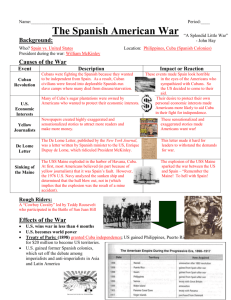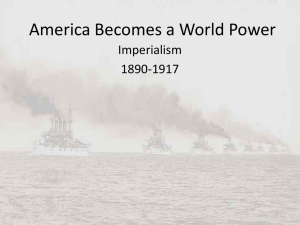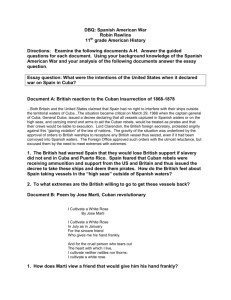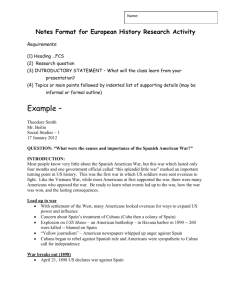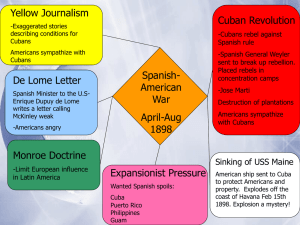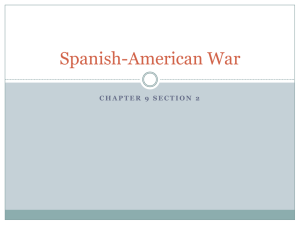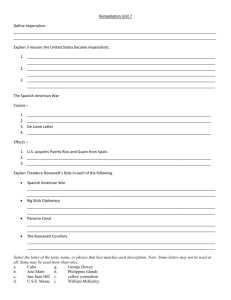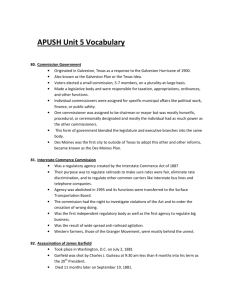THE SPANISH-AMERICAN WAR
advertisement
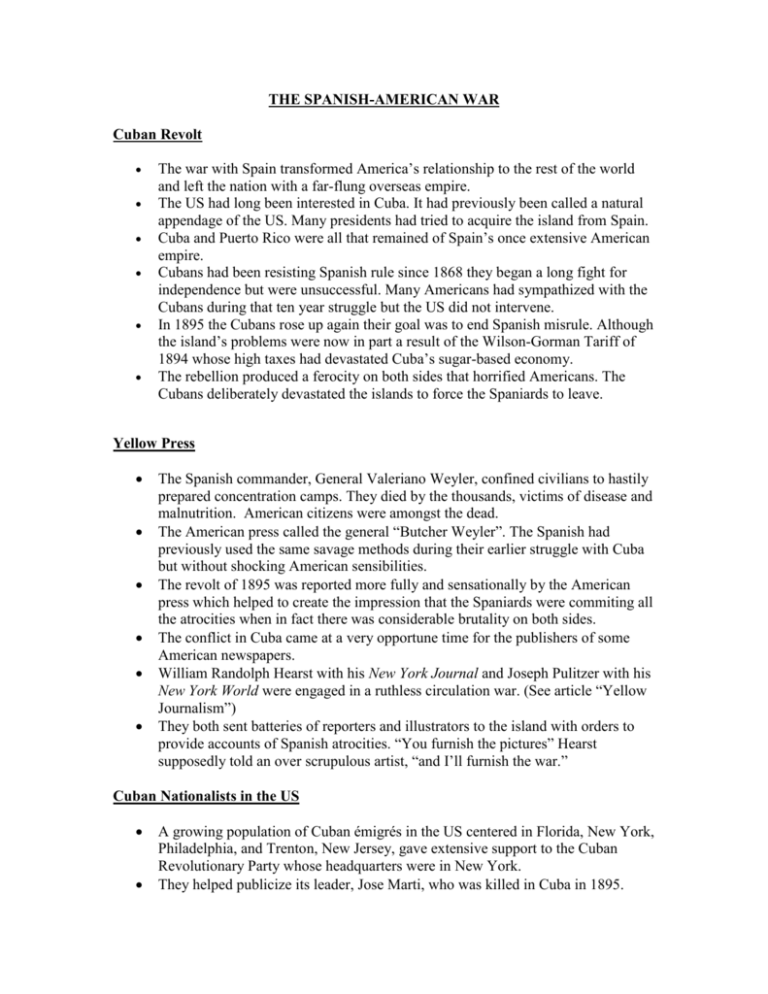
THE SPANISH-AMERICAN WAR Cuban Revolt The war with Spain transformed America’s relationship to the rest of the world and left the nation with a far-flung overseas empire. The US had long been interested in Cuba. It had previously been called a natural appendage of the US. Many presidents had tried to acquire the island from Spain. Cuba and Puerto Rico were all that remained of Spain’s once extensive American empire. Cubans had been resisting Spanish rule since 1868 they began a long fight for independence but were unsuccessful. Many Americans had sympathized with the Cubans during that ten year struggle but the US did not intervene. In 1895 the Cubans rose up again their goal was to end Spanish misrule. Although the island’s problems were now in part a result of the Wilson-Gorman Tariff of 1894 whose high taxes had devastated Cuba’s sugar-based economy. The rebellion produced a ferocity on both sides that horrified Americans. The Cubans deliberately devastated the islands to force the Spaniards to leave. Yellow Press The Spanish commander, General Valeriano Weyler, confined civilians to hastily prepared concentration camps. They died by the thousands, victims of disease and malnutrition. American citizens were amongst the dead. The American press called the general “Butcher Weyler”. The Spanish had previously used the same savage methods during their earlier struggle with Cuba but without shocking American sensibilities. The revolt of 1895 was reported more fully and sensationally by the American press which helped to create the impression that the Spaniards were commiting all the atrocities when in fact there was considerable brutality on both sides. The conflict in Cuba came at a very opportune time for the publishers of some American newspapers. William Randolph Hearst with his New York Journal and Joseph Pulitzer with his New York World were engaged in a ruthless circulation war. (See article “Yellow Journalism”) They both sent batteries of reporters and illustrators to the island with orders to provide accounts of Spanish atrocities. “You furnish the pictures” Hearst supposedly told an over scrupulous artist, “and I’ll furnish the war.” Cuban Nationalists in the US A growing population of Cuban émigrés in the US centered in Florida, New York, Philadelphia, and Trenton, New Jersey, gave extensive support to the Cuban Revolutionary Party whose headquarters were in New York. They helped publicize its leader, Jose Marti, who was killed in Cuba in 1895. Cuban Americans formed other clubs and associations to support the cause of Cuba Libre. In some areas of the country their efforts were as important as those of the yellow journalists in generating popular support for the revolution. These clubs and associations also provided financial support for the Cuban rebels. Add to the growing “Jingoism” of the times war against the Spanish was receiving mass support amongst much of the country. Extreme patriotism in the form of an aggressive foreign policy. Theodore Roosevelt was the biggest supporter of aggressive overseas policies. The De Lome‘s letter and the Sinking of the Maine The mounting storm of indignation against Spain did not persuade President Cleveland to support American intervention in Cuba. He proclaimed American neutrality and he urged authorities in NYC to try to stop the agitation by Cuban refugees there. McKinley became president in 1897 he took a stronger stand and protested against Spain’s “uncivilized and inhuman” conduct. The Spanish govt responded by recalling Weyler and granting the island a qualified autonomy. It seemed that American involvement in the war might be averted. Any chance of a peaceful settlement vanished as a result of two events in February 1898. The first occurred when a Cuban agent in Havana stole a private letter written by Dupuy De Lome, the Spanish minister in Washington, which he then turned over to the press. The letter described President McKinley as a weak man and “a bidder for the admiration of the crowd” This was no different than many Americans, including some Republicans, were saying about their president. (Theodore Roosevelt described McKinley as having “no more backbone than a chocolate éclair.” But coming from a foreigner it created intense popular anger. De Lome promptly resigned. Before the excitement about the De Lome letter died down. The American battleship the Maine blew up in Havana harbor killing more than 260 people. The ship had been ordered to Cuba in January to protect American citizens and property against possible attacks by Spanish loyalists. Many Americans assumed that the Spanish were responsible. It was also incorrectly reported that a Spanish mine or torpedo had sunk the ship (Yellow press!!) Later evidence suggested that the disaster was actually the result of an accidental explosion inside one of the engine rooms. The yellow press had a field day “Remember the Maine! To hell with Spain!” became a national chant for revenge. War hysteria swept the country, and Congress unanimously approved $50 million for military preparations. McKinley’s War Message and the Teller Amendment McKinley still hoped to avoid war. However others in his administration were clamoring for war (including Theodore Roosevelt the Assistant Secretary of the Navy) In March 1898 the president asked Spain to agree to an armistice and an end to all the concentration camps. Spain agreed to stop the fighting and eliminate the concentration camps but refused to negotiate with the rebels and reserved the right to resume hostilities at its discretion. This did not appease public opinion or Congress. A few days later McKinley asked for and on April 25th received a congressional declaration of war. Make sure to read McKinley’s War Message to Congress and as you read think about what it suggests about the underlying causes of the Spanish-American War. The Teller Amendment was an amendment to a joint resolution of Congress enacted on April 18th 1898 in reply to President McKinley’s War Message. It placed a condition on the US military in Cuba. According to the clause the US could not annex Cuba but only leave “control of the island to its people” Senator Teller of Colorado proposed the amendment to ensure that the US would not establish permanent control over Cuba after the end of the fighting with Spain.

